 "Every 26 minutes a pastor leaves ministry never to return." This stunning headline appeared in an email forwarded to me from a friend. I did the math. This works out to about 1700 every month. What on earth is going on? I thought pastors were among the happiest people on earth! But then again, so are church-goers, right? And yet church membership is on the decline. What could be the cause? Burnout? "BETRAYED: The Clergy Killer's DNA," a 2012 documentary film, reviewed online by Mike McManus, suggests something much more sinister. The film aims to uncover an element of evil it suggests is lurking largely undetected in congregations around the world. As one pastor put it, "So many ministers are being destroyed by evil and evil people in the life of the church who are willing to take the throat out of the pastor." Another adds, "It may be one or two or eight to ten in a congregation who give themselves to evil purposes for their own narcissistic benefits." A third asserted, "These people who act with viscous[sic] hearts are often called clergy killers." Moreover, the film asserts that virtually every congregation has them, though they are usually very few in number, only a tiny percentage of the total congregation. The purpose of the film is to serve as a warning to both the clergy and congregations to wake up and handle the dangerous undermining elements that would attack and drive away the good in our churches. While I don't think it is helpful to personalize evil to particular people, it doesn't take a rocket scientist to observe that three different mental elements sometimes appear in many church congregations – some with helpful aspects, others not so much. 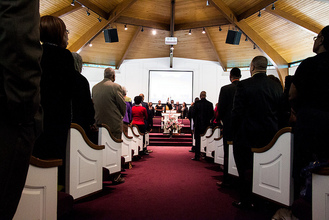 The first takes the form of an energetic, inspired, willingness to work - call it the “GoGo" mentality - where great effort is devoted to prayer and genuine good works in support of the church and its mission. But sometimes this energy and devotion is undermined by a sense of human do-goodism. Church activities take on a life of their own and the God-link - where divine Spirit is the source of all good ideas and the power of performing them - is lost. Church work becomes a burden and fellow members seem more like opponents than colleagues engaged in achieving common goals. Then you have what we can call the "Blue Sky" perspective, expressed by well-meaning, good intentions and hopes for the church. But lacking any particular vision, purpose or drive, this mental state is easily influenced by the opinions of others or by the threat of any dark cloud that tries to disturb its sense of harmony. A third mental condition involves foot-dragging and resistance to progress or change. A good name for this is the “NoNo" mentality. Beyond negative, this condition sometimes appears benign and even supportive of the leadership and direction of the church; but it's not. It sometimes uses the method of pleasant persuasion to influence others to its cause which, often unbeknownst even to the one expressing it, is to stop forward movement and effectiveness of the church in the community. The NoNo attitude takes the joy and inspiration right out of church through a barrage of spoken and silent negativity. In many instances, it is ignored or simply tolerated until it accomplishes its task of undermining progress. NoNo behavior might destroy a pastor's reputation to get him or her ousted from church. In other cases it so discourages the GoGo and Blue Sky thinkers that they abandon ship precipitately or simply drift quietly away. 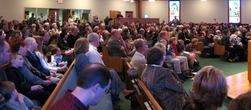 When these scenarios play out, congregations think they are only dealing with a local issue. But now it's being examined as a global phenomenon. So what's really at work here? And what can we do about it? The Bible refers to evil as devil, Satan, or the Adversary. Neither Satan nor evil is an actual person. The devil or evil is a false claim of power or opposition to God who is actually universal, omnipotent good – the only real power. Evil is a pretender. It is supposititious, referring to its fraudulent nature as designed to deceive. This is exactly how evil is described in the Genesis 3 allegory that explains evil and its origins. In the allegory a talking serpent tells a lie and seduces Eve into disobeying God and doing its bidding. Having fallen for the suggestions of this talking serpent herself, she in turn uses her influence to convince her husband to follow her down the same path. 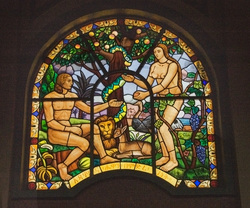 I suppose we sometimes forget that, although fictional, these characters are not defenseless in the allegory. Eve and Adam knew what they were supposed to do. But they accepted the arguments of a subtle serpent instead of promptly and resolutely shutting them out. And of course as the story goes, there were sad consequences that followed that decision. I think this allegory points out a couple of things. 1) Evil isn’t personal. While we might see ourselves facing the downside of one of those thought patterns in church (GoGo, Blue Sky, or NoNo), we can make a correction. Personalizing evil or taking personal credit for good in church is never healthy. But separating evil from person and letting God as the source and power of good guide the church and its members always is. With watchfulness and moral courage we can throw off the serpent of negative influence that would disrupt our church experience. We may blame a snake all day for what we perceive to be wrong in the church, but there comes a point when reason takes over and we must admit that talking serpents aren’t real. We don’t have to be duped. 2) Good is the only real and permanent influence. After the whole complicated story of evil is told, Adam and Eve are discovered in Christian Science to be only matter-based beliefs suggesting we all have built-in character weaknesses, as if God actually created us that way. The real account of our origin and condition is given in Genesis 1, where God’s man is revealed through spiritual light and revelation to be formed of Spirit, and thus to be entirely spiritual and good. The real man, created by God, has dominion over every creeping suggestion of evil. And through our prayers and alignment with this true view of man’s origin, we can wake up to the innate power of good as the only real and lasting influence on the church.  Christ Jesus did. He dealt with the mental assault of suppositional evil in what is referred to as the "temptation of Christ." (See Matt 4.) The devil, aptly referred to as the tempter in this scenario, promised what it couldn't deliver if only Jesus would fall down and worship this deceiver. Jesus didn't waste any time considering his options. He forcefully renounced this pernicious suggestion saying, "Get thee hence, Satan." The attempt to persuade him to abandon his mission and forsake a waiting world was thwarted. Mary Baker Eddy, discoverer of Christian Science and the first Pastor of the Church of Christ, Scientist, had learned through experience that individual well-being, safety, and progress in the church come from guarding the door of our thinking. She urged her students to follow the Biblical injunction to "let this mind be in you which was also in Christ Jesus." (Philippians 2:5) One paraphrase of that is “Think of yourselves the way Christ Jesus thought of himself.” (Peterson, The Message) Christ Jesus knew that he and those around him were Spirit-made and empowered only by divine Good. He couldn’t and wouldn’t be deceived to follow a path that would be self-destructive or a danger to others. Being aware of this divine goodness in us and our fellow church members makes us strong and courageous. It keeps us focused on our true mission in the world and God’s vision for His church. Filled with goodness which comes from God, our divine Mind, we are naturally shielded from evil suggestions and find that we can stay the course, helping our brothers and sisters to stand for good in church and progress in the community. Mrs. Eddy explained, “The self-seeking pride of the evil thinker injures him when he would harm others. Goodness involuntarily resists evil. The evil thinker is the proud talker and doer. The right thinker abides under the shadow of the Almighty. His thoughts can only reflect peace, good will towards men, health, and holiness.” (The First Church of Christ, Scientist and Miscellany, 210)
Not a subscriber and want to be?
It's easy! Just sign up in the sidebar. You may also wish to: VISIT MY WEBSITE HOME PAGE FIND LINKS TO MY OTHER PUBLISHED CONTENT LISTEN TO A COLLECTION OF MY "YOUR DAILY LIFT" 2-MINUTE PODCASTS  On vacation in Myrtle Beach, South Carolina, members of my family were at each others' throats. The sun and fun left us all pretty exhausted and irritable. My husband and daughter would not let up on fussing at each other. My patience with them both had reached its limit. At a certain point, when I had had enough, I informed them that we were going to attend the Wednesday evening testimony meeting at the local Christian Science church. I would not take "No" for an answer. It was a first time visit to a Wednesday meeting for my husband, and a first time out of the children's room and into the pews for my 8-year-old daughter. As we listened to the inspired Word of the Bible and correlative passages read from Science and Health with Key to the Scriptures - the complete exposition of Christian Science by its discoverer, Mary Baker Eddy - a change occurred in us all. My restless daughter quieted. The frown wrinkles on my husband's face - signaling fatigue, grumpiness and resistance to being in the church - ironed out. I began to feel more peaceful and relaxed. We listened to readings, we sang hymns, we prayed for each other, and we heard examples, through personal testimony of the attendants, of God's law of harmony in action in their lives. There were accounts of lost articles found in amazing ways, physical cures through prayer, financial difficulties overcome. It was only an hour. But when we left the church, my husband said, "Thanks. I feel better." And the rest of the trip proved to be one of our happiest ever.  I am frequently asked, "What is Christian Science?" Like anyone engaged in the active practice of a science, I have several "go to" answers. For example, I might describe it as the scientific system of divine healing based on the teachings of Christ Jesus. But there is another simpler definition found in Science and Health. It is " the natural law of harmony which overcomes discord." How simple and direct! The complete reference is found on page 134: "The true Logos is demonstrably Christian Science, the natural law of harmony which overcomes discord, - not because this Science is supernatural or preternatural, nor because it is an infraction of divine law, but because it is the immutable law of God, good." Christian Science is the natural law of harmony which overcomes discord. Thinking back to that Wednesday meeting during our summer vacation, there was nothing supernatural or even unusual about it. It was pretty typical of many I have attended over the years. But the meeting gave us a simple, straightforward opportunity to engage with the immutable - unchanging through time, unalterable, ageless - law of God, good: Christian Science. Engagement, even for an hour, with the natural law of harmony, can blow away the gloomy clouds of discord. It certainly did for us. Are you on vacation and looking for a local Christian Science church, society, informal group or Reading Room? Search online. To be sure you don't miss something,
you can have new posts delivered to your email inbox. Simply subscribe in the sidebar. And if this post is meaningful to you, it may also help others. Please share! You may also wish to: VISIT MY WEBSITE HOME PAGE FIND LINKS TO MY OTHER PUBLISHED CONTENT LISTEN TO A COLLECTION OF MY "YOUR DAILY LIFT" 2-MINUTE PODCASTS 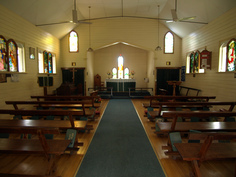 In my experience, church and God’s abundant grace are linked. I am grateful to have learned early on that serving God through serving in church brings out good, good, and more good. Paul said, “Your life is hid with Christ in God” (Col. 3:3). And I might add, “and if you want to find it, participate in your local church!” Real life, reflecting divine Life, or God, includes the substance of good in abundance and there is nothing like the opportunities to give and serve in a branch Church of Christ, Scientist to bring it out. When I was 18 years old and living in Great Britain, I was desperately low on funds. With two weeks to go before returning to the US, I was down to my last £85... (To read the rest of this blog, find it here on Church Alive.) LINK IS NOW FIXED Church is an idea that has been defined in many ways over the centuries within the Christian tradition. For Christian Scientists, church is much more than a place or a community. Church Alive is a web community that explores the spiritual basis and awakening impact of Church. I hope you enjoy this blog. And if you do, I doubly hope you will share it!
If having a full-text version delivered to your email inbox would interest you, you can find the subscription box in the sidebar. You may also wish to: VISIT MY WEBSITE HOME PAGE FIND LINKS TO MY OTHER PUBLISHED CONTENT  Passion. Whether it is for a special person, a valued project or a life goal – who doesn’t adore that feeling of heightened purpose and breathless, eager anticipation that we call passion? I am not talking about a mere physical reaction or emotional bond. Passion, in its spiritual sense, is the fire of inspiration and pure love for its subject. Many go to great lengths to find something to be truly passionate about. When they do, they hope to sustain the feeling as long as possible. But when the initial fire dies down into embers, does this mean that the love and inspiration is coming to an end? Is there something we can do to fan the flame and rekindle the ardor of inspired commitment to that something or someone we love? In a long relationship between individuals, in a career or with organizations, duty or responsibilty can tend to take the place of joy and spontaneity; and inspired thinking and acting can suffocate under the daily grind. In this case, what we may have once fiercely loved can tend to become a trial of patience and a test of endurance. The Bible offers some insight into what happens when fresh thought fades into habitual patterns of thinking and acting. The apostle John delivered a message from the Revelator - from Jesus Christ - to a church in Ephesus, Greece that had fallen victim to daily routine. He warned: “I know thy works, and thy labor, and thy patience, and thou hast… borne and hast not fainted. Nevertheless I have somewhat against thee, because thou hast left thy first love.” (Revelation 2:2-4) 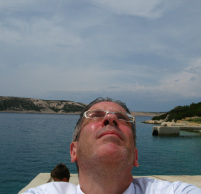 The way I see it, the Revelator commends the fact that they are hanging in there and plugging along. But what happened to the passion of their first love, the fervor for their purpose in laboring, working together? Kindly, John doesn’t leave them to flounder under this diagnosis. He also delivers some sage advice. He says, “Remember therefore from whence thou art fallen, and repent, and do the first works.” (Revelation 2:5) Here, passion is linked to vision, a spiritual vision involving inspiration. When we recapture the inspiration that initiated or spurred on a good idea or relationship, we have reconnected with the flame – the first love that restores joy and purpose. When actions spring from renewed vision, they act like a fan drawing on a spark until the full blaze is restored. Find inspiration and you find a reason for being. Express the inspiration by doing the “first works” - approaching the relationship with a virgin attitude ("Fresh; new; unused; as virgin soil" - Webster's 1828 Revised Unabridged Dictionary) and the fire tends to spread to those around you. During the first decade of marriage, my husband and I fell comfortably and naturally into the routine of work and family responsibilities. We had a sweet, loving relationship with mostly ups and very few downs. However, as steady and generally smooth as things were, we were still two people evolving at our own pace, with interests and activities that sometimes converged and often diverged. To a certain extent, we had let our relationship become a bit dusty. Nearing our tenth anniversary, I was longing to rediscover the fire of purpose in the relationship.  This wasn’t something I felt I could discuss with my husband. I didn’t know if he was feeling as out of sorts as I was. I certainly didn’t want to hurt him or frighten him by exposing my thoughts too soon. So before I brought anything to his attention, I decided to pray about my marriage – and to pray for my marriage. I had always felt our relationship was a gift from God, so it seemed perfectly normal to take my questions up in prayer. Ours was a marriage formed in prayer. I had been praying daily to see the qualities of God expressed in a life-companion. When I met my husband, I recognized his divine qualities right away. After the marriage and over time, regular, consistent prayer for the marriage dropped off and was replaced by the general day-to-day business of the family. And the vision? The inspiration? The fire and passion? That, too, had slowly faded out as the relationship was more and more deprived of that element of prayer so essential to its formation. So the Revalator's advice to that Ephesus church was on the mark for me. I rediscovered my “first love” through doing the “first works” – practicing again the consistent prayer that had brought us together in the beginning. One of my issues with the marriage concerned the subject of spirituality. This was clearly a big part of my life. For him? Not so much. I was the church goer, he worked on Sundays. I was spiritually hungry - a genuine seeker. He seemed to have no spiritual curiosity whatsoever. So I asked God in prayer, “After ten years together, are we really on completely different life paths? Is there anything that we can do to bring these two different tracks together?”  As I did some spiritual study on the subject of marriage, I came across a statement that provoked me to wake-up. It is in Mary Baker Eddy’s Science and Health with Key to the Scriptures – a book that really brings the Bible’s message to life. On page 90, she writes, “The admission to one's self that man is God's own likeness sets man free to master the infinite idea.” I had been thinking that if only my husband would change, or admit to himself that he was spiritual, we could rediscover our bond. Now I realized it didn’t depend on him at all. He wasn’t the one thinking he wasn’t very spiritual. That was my issue. I saw that if I admitted to myself that my husband was God’s own likeness, this would set us both free to master the infinite possibilities of our marriage. I took up daily prayer to watch for, and be a witness to, my husband’s spirituality, and I began to notice so many of his spiritual qualities. Marriage, to me, became a full-on commitment to witnessing to the best in each another. My sense of marriage was reborn. I discovered that the passion I had been seeking was present in direct proportion to my prayers and spiritual witnessing. Our life together was once again full of joy and inspiration. I never said a word to him about this prayer and spiritual renewal, because my struggles on the subject were between me and God. But he noted that the marriage was better than ever, and he was right. Prayer isn’t just last minute emergency life-support. Prayer can be a permanent life-link to a passionate expression of Life, God. If you are looking for more passion in your life, for renewal of commitment, and fresh joy in your familly, your work, your church, I highly recommend a regimen of prayer that opens you to see more of the divine expressed in and around you. The admission to yourself that you and those in your midst are God’s own likeness, can set you free to live a truly inspired life – aflame with divine Love. This post first appeared on this blog under the title "Aflame with Divine Love" on November 2, 2011. It has been revised and new links have been added. If you find this post interesting or helpful, please share it!
Also, it is quite easy to subscribe to the blog if you would enjoy receiving updates. Simply put your email address in the box provided in the righthand column and click "Subscribe me!" You may also wish to: VISIT MY WEBSITE HOME PAGE FIND A LIST OF MY OTHER PUBLISHED CONTENT  Who hasn’t heard this? Play by the rules in sports and you’ll play fair. Play by the rules of the road and you’ll be safe. Play by the house rules and you won’t get in trouble! During a lecture tour to South Africa, Zimbabwe, Australia and New Zealand, I learned how important it is to play by the rules of my church. I was thrilled to take this tour. I’d always wanted to visit these countries and now I would have the opportunity to share with others the subject dearest to my heart – Christian Science. I felt really prepared and things were going along just fine as I went from city to city. People were really interested and glad to have an opportunity to have their questions answered. Some misunderstandings came to light and were corrected. I was feeling pretty good about everything except for one thing. Many of my hosts would invite me for refreshments and mingling after the lectures concluded. As kind as they were to want to offer a reception for me in appreciation for my coming so far, I really felt compelled to go back to my hotel and be quiet, to ponder the ideas shared in the lecture and to pray for all those who came. But I didn’t feel comfortable excusing myself from the company of my hosts. So I stayed for the social part of the events. 2/15/2012 Cancer healed On Wednesdays throughout the world, people gather in churches and in groups to share what they have seen and experienced of God's, Truth's, healing power. You hear some pretty amazing things at a Wednesday evening testimony meeting in a Christian Science church. It's not who is speaking or even how the story is told that makes this sharing so special. One feels the power and presence and love of God, through Christ, that heals. In the Church Manual, Mary Baker Eddy wrote, "More than a mere rehearsal of blessings, it scales the pinnacle of praise and illustrates the demonstration of Christ, "who healeth all thy diseases" (Psalm 103:3)." Here is my testimony. In 2001 I began exhibiting symptoms of breast cancer. My mother had a mastectomy a few years earlier. My aunt also had a mastectomy, but she passed away from the disease. I had a young daughter. I had no intention of going anywhere, nor did I wish to see her become a victim of this disease. So when I began developing symptoms, I felt I had no choice but to stop this epidemic of fear and disease in the family. 1/9/2012 Prayer for the home team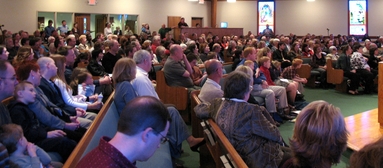 As the football playoff games started up yesterday in the States, a Facebook friend said that when asked if she prays for football games, she responds, "Yes, I do! I pray for the home team!" I chuckled, because I had just had similar thoughts that morning about my church - I pray for the "home team" of spiritual seekers who attend. Not everyone interested in spirituality is drawn to church. I, however, am an avid churchgoer. In fact, what keeps me coming back is a little rule in our church about prayer. Prayers in Christian Science churches are to be "offered for the congregations collectively and exclusively." (Church Manual 42:1) Now one might say, wait a minute! Why a rule instructing who or what to pray for in church? Why wouldn't you pray for yourself, your sick pet, or for harmonious elections in the Congo? The answer relates to what we are up to the rest of the week. 11/28/2011 Some thoughts on substance and supply ___Yesterday's post with the poem on being a transparency for God's light reminds me of something Mary Baker Eddy wrote in her autobiography Retrospection and Introspection. "Man shines by borrowed light. He reflects God as his Mind, and this reflection is substance, — the substance of good." (p. 57) Light is one of those things we experience more than see or touch. We experience the effect of light all around when objects are illuminated or temperatures are influenced. Metaphysically, spiritual substance is the effect or reflection of divine Light, God. It is manifest in all that is good and permanent, but is never limited in matter. In the Bible, Paul links hope with substance when he speaks of faith. He said, "Faith is the substance of things hoped for, the evidence of things not seen." (Hebrews 11:1) Paul enlarges the sense of substance from something material to an understanding and expectation of something better, something unlimited and sourced in Spirit, God. To Paul, faith, hope and substance are tangible and spiritual. They manifest the Christ, the God-power and God-presence flowing from spiritual understanding. Substance, like faith and hope, is revealed by Christ through a spiritual sense that recognizes spiritual good. |

Find me on YouTube
I have practiced Christian Science professionally in some form since 1979. But my journey with Christian Science started in a Sunday school where as a young child I was taught the Scriptures and some simple basics of Jesus' method of scientific Christian healing. A significant experience at the age of twelve opened my eyes to the great potential of this practice. After impaling my foot on a nail, I prayed the way I had learned in Sunday school. Within moments the pain stopped and healing began. By the next morning the wound had disappeared completely. Having experienced the great potential of Christian Science, there would be no turning back. |
INFORMATION |
SERVICES |
HELP |
© 2011-2024 Michelle Boccanfuso Nanouche, CSB. All rights reserved. Pages updated July 1, 2024.


 RSS Feed
RSS Feed
